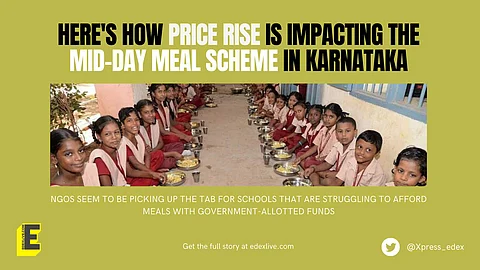

Though government schools have been registering almost full attendance ever since they reopened following 18 months of closure due to the COVID-19 pandemic, schools in many districts of Karnataka are struggling to ensure proper midday meals for students. Though the government resumed midday meals from November 2, it just supplied rice and wheat while putting the onus of purchasing tur dal, edible oil and vegetables on the respective school heads.
As per the June 23, 2020 directive of the government, each student of Classes I to V is supposed to get 20 gram of tur dal and 50 gm of vegetables in midday meals, whereas each student of Classes V to X is supposed to get 30 gm of tur dal and 75 gm of vegetables. The government has fixed a paltry Rs 4.97 for each student from Classes I to V and just Rs 7.45 for each student from Classes V to X.
On the other hand, the prices of edible oil is hovering around Rs 150 a litre while tur dal is selling at Rs 100 per kg in the market. Similar is the situation with vegetables across the state, say wholesale merchants. This seems to have put schools heads and midday meal scheme workers in a tight spot, said the Koppal district scheme workers’ union president Laxmi Sonar.
However, Mysuru region has managed to overcome this as most schools have been given full independence to purchase food grains. “As per the orders, we have instructed the school authorities to purchase from the funds meant for other food grains and the price of rice has not been affected much. There is nearly 86-89 per cent successful implementation of the scheme in the district,” said midday meal executive officer C Lingarajaiah.
This is also the situation at 146 schools where food is provided by the Akshay Patra Foundation of ISKCON, he said. The commodity price rise has not had an immediate effect on the midday meal scheme, but will have an impact in the near future, opined Johnson K A, principal of St Michael’s School in Madikeri. “The commodities for the scheme have already been supplied by the government and there is no problem as of now. But it may become challenging to manage the quality of food in the near future. The repercussions of the price rise are likely to affect schools with less student strength as it will be tough for them to buy commodities with the sanctioned minimum funds,” he explained.
The hike in prices of vegetables and groceries will not impact students of the midday meal scheme in the Dharwad district. The meals here are being distributed by the Adamya Chetana and Akshay Patra. As NGOs are distributing the meals, there are no difficulties, Deputy Director of Public Instructions Mohankumar Hanchate said. Usha M, Executive Officer, Akshara Dasoha, Dakshina Kannad, informed that pulses and cooking oil were being supplied by the state government and schools purchase only sambar powder, salt and vegetables.
“The price rise might have affected the midday meal scheme and schools are sending proposals to increase the government funds. We have written to the government to revise the rates due to the high costs. This year, since there were no midday meals due to closure of schools, the rates have not been revised. The rates will be hopefully revised the next academic year. The schools with more student strength do not face any issues. Only those schools with less strength are facing problems,” she said.
Koppal Deputy Director of Public Instruction Doddabasappa Neeralakeri informed on Tuesday, November 16, that edible oil and tur dal will be supplied by next week.
An official of the midday meal scheme in Shivamogga said schools have been temporarily asked to purchase oil, pulses and vegetables locally. But the prices vary from town to town and village to village. While the government allows the purchase of refined sunflower oil at up to Rs 140 per litre, headmasters purchase it at a higher price in the local market.
“Tur dal price also varies from Rs 100 to Rs 120 per kg. The schools purchase it at a higher price without compromising on quantity. We credit the money to the bank accounts of cooks or headmasters,” said G Lohith, Assistant Director of the midday meal scheme. Kalaburagi district mid-day meals scheme officer Ramalingappa said the attendance of students, which was 50-60 per cent till November 13, has increased to 75 per cent from November 16. As such, the district has not faced problems in providing midday meals so far.
The delay in supply of rations is because of delay in tenders, and not short supply, said officials from the Education Department. Tur dal is yet to be supplied in schools in Benglauru Rural district. It will be supplied in two days, said the Bengaluru Rural DDPI, blaming the delay in the tender process. He said schools were so far supplying ration kits to children and midday meals started only recently. Meanwhile, an indent for additional students admitted to schools will be placed soon, he added.
The Bengaluru Urban DDPI pointed out that midday meals are supplied to schools by ISKCON. In Hassan, the school managements have to compromise on quality by using vegetables available at lower cost in the market. The headmaster of a government higher primary school said the amount released to buy vegetables is not sufficient as the prices have increased drastically. “We have to search for low-cost vegetables and have no option but to compromise on quality,” he added.
The state government will soon direct the Karnataka Food and Civil Supplies Corporation to provide pulses, oil and salt and the Food Corporation of India will supply rice as per the requirements of the districts. Schools with a strength of fewer than 100 children are facing problems in purchasing vegetables, spices and chili powder, sources in the Public Instructions Department said.
